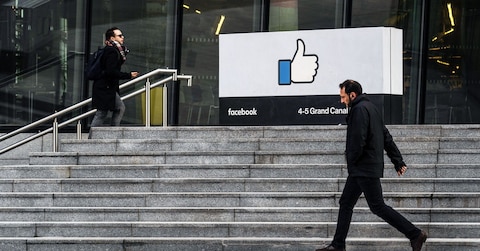Analysis | The Technology 202: Businesses are snapping up thermal cameras to detect coronavirus, but they have limits – The Washington Post
with Tonya Riley
The coronavirus pandemic is spurring a buying spree for thermal-imaging cameras that could detect people’s fevers.
Manufacturers of the cameras say they’re rushing to meet demand, as businesses try to keep essential workers safe from infected customers –and plan for when the economy starts to reopen. Their cameras, they say, can conduct temperature screenings more quickly and efficiently than traditional thermometers – all from a safe social distance.
“I never would have thought six months ago we would be looking to screen workplaces,” said Jim Cannon, chief executive of FLIR Systems, a thermal imaging company. “No one anticipated the impact this virus has had on our world.” He’s drawing major clients in the travel and hospitality industries: Emirates Airline and Wynn Resorts in Las Vegas said they purchased cameras from FLIR.
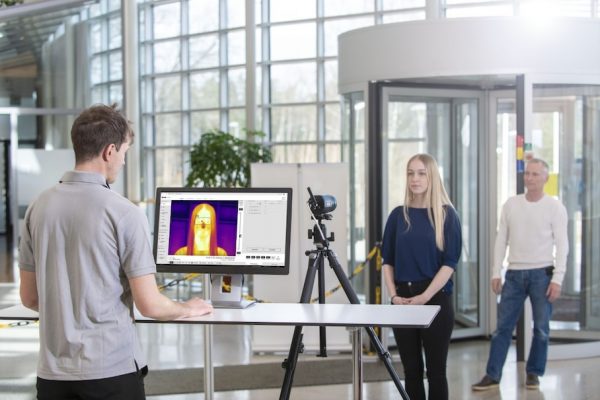
How FLIR’s thermal camera system works. (Photo provided by the company.)
Gary Strahan, the owner of Infrared Cameras Inc., says his customers include essential businesses where workers are still coming in, such as FedEx. But he also says his client list is expanding to include major tech companies such as Facebook, along with retailers and financial services. (Facebook and FedEx declined to confirm this, though the shipper said it was using “no-touch” technology to screen its workers.)
Amazon is reportedly using thermal cameras in its warehouses, as the company faces pressure to do more to protect workers as coronavirus cases are reported in its facilities. (Amazon’s chief executive, Jeff Bezos, also owns The Post.)
But privacy experts are concerned about a rush to deploy health surveillance systems.
Especially without public health officials presenting enough evidence that they would actually be effective in combating the virus’s spread.
“Everybody’s worried that freedoms that we are giving up to fight this disease might be hard to get back,” said Jay Stanley, a senior policy analyst at the ACLU Speech, Privacy, and Technology Project. “It’s just an early indicator of how powerful the technology that’s coming out is going to be. Right now, we need to be careful about what kind of precedent we set.”
The cameras are no panacea when it comes to determining whether someone is carrying the novel coronavirus.
Such cameras have been deployed at borders and airports in Asia since the SARS epidemic — and public health authorities have previously warned that temperature screenings are no silver bullet.
The World Health Organization says on its website that “temperature screening alone may not be very effective as it may miss travelers incubating the disease or travelers concealing fever during travel, or it may yield false positive (fever of a different cause).”
And an elevated body temperature doesn’t mean someone is positive for the coronavirus. Environmental conditions or a medical condition other than coronavirus could elevate someone’s skin temperature and trigger the systems.
A normal temperature reading also doesn’t rule out that someone is a carrier. Some experts warn the systems could give employees and customers a false sense of security. Centers for Disease Control and Prevention Director Robert R. Redfield said in a recent NPR interview that as many as 25 percent of people who are infected may not show symptoms. And those who ultimately do show symptoms, he added, might actually transmit the virus for two days before symptoms appear.
New customers need to understand the limitations of the cameras.
“We’re really keen to make sure that people understand what technology can do and can’t do and then employ it in the right manner with all their protocols to compensate for this technology’s shortcomings,” Cannon said. “We’re very careful to qualify that this is simply a screening tool, it’s not a diagnosis. And no one technology certainly is foolproof.”
FLIR’s thermal imaging cameras have been widely deployed in airports and borders for more than a decade, in countries including South Korea, Japan and China. But in the United States, Cannon says most of the demand is coming from private businesses, which may not be used to doing this kind of screening when a person enters. So the FLIR sales team is working with the companies to provide guidance on appropriate procedures and protocol, he said.
“This is new territory for us,” Cannon said.
There’s also concerns there will be a rush of unproven systems in the market as demand surges. Both FLIR and ICI say their systems have been approved by the Food and Drug Administration. But NBC News’s April Glaser reports that many companies are touting products without such approval, including Athena Security, Feevr and Remark Holdings.
The spread of thermal cameras could open the floodgates to broader U.S. surveillance, privacy advocates warn.
Matthew Guariglia, a policy analyst at the Electronic Frontier Foundation, is concerned that cameras constantly monitoring workers of any kind could create a new network of surveillance cameras.
“These cameras are specifically put into place for the purpose of monitoring the faces and bodies of your employees,” he told me.
But Cannon argues that the systems are less invasive than existing security camera systems, because they’re displaying the emission of heat from a person rather than a detailed image.
NOTE TO READERS: We’ve debuted a redesign of the Technology 202 this week, aimed at making this tipsheet cleaner, sharper, and easier to read. Please let us know what you think here. Thanks for being a Technology 202 reader, and tell your friends to sign up here.
Our top tabs
Uber’s rush into alcohol delivery puts it at odds with the law.
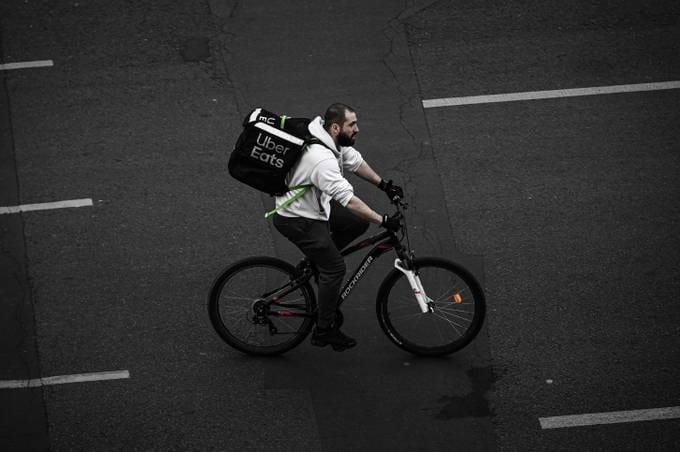
A man delivers for Uber Eats. (Philippe Lopez/AFP/Getty Images)
Drivers have not received instructions about how to properly deliver alcoholic beverages, and some are dropping them off in illegal packaging at doorsteps without ever checking customers’ ages, my colleague Faiz Siddiqui writes. UberEats rushed into alcohol delivery during the coronavirus pandemic as states eased laws to allow restaurants to continue selling the beverages.
That leaves drivers liable for selling minors alcohol, perhaps unknowingly, because Uber’s app doesn’t tell them if an order contains alcohol: “It’s not worth the risk for $4,” one person who has worked as a courier for Uber Eats told Faiz.
Half a dozen drinks ordered by The Post from UberEats did not meet even relaxed state guidelines, Faiz reports. The California Department of Alcoholic Beverage Control said it was opening an investigation after The Post contacted the agency with its findings. Uber Eats spokeswoman Meghan Casserly said that the company removed alcohol listings from the restaurants flagged by The Post.
“While laws and regulations are shifting rapidly during this pandemic, it’s important to note that Uber Eats does not currently allow alcohol sales in California, so we take these types of reports very seriously,” Casserly said.
Microsoft executives say the coronavirus pandemic underscores the need for a federal privacy law.
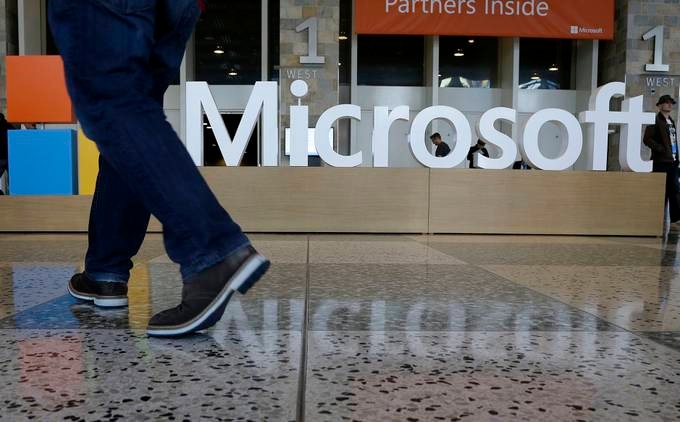
A man walks past a Microsoft sign set up for the Microsoft BUILD conference at Moscone Center in San Francisco. (AP Photo/Jeff Chiu, File)
“In the U.S., the need for this conversation in the midst of a pandemic underscores the urgency for a strong federal privacy law,” write Julie Brill, chief privacy officer, and Peter Lee, corporate vice president for research and regulation.
“An updated legal framework placing obligations on businesses that collect and use personal data would help provide the necessary guardrails for companies to know how to protect and respect personal data as they create tools and technologies to address urgent societal needs.”
The Washington state tech giant is weighing in on a growing debate between privacy and public safety as it is providing AI to researchers, developing a self-checking tool and protecting hospitals from ransomware. The executives also released privacy principles to which they urge governments to adhere when using technology in their responses, including:
- Providing transparency around why data is collected and how it is used
- Giving people a choice over where their data is stored
- Limiting data use to public health applications
- Deleting data once the emergency is over
Amazon-owned Whole Foods is trying to map out which stores are at highest risk of unionizing.
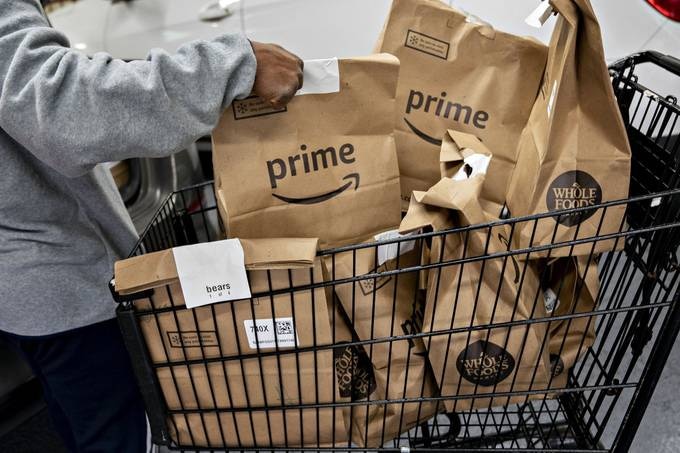
A contractor picks up an Amazon Prime grocery order at a Whole Foods store in Washington, D.C., on March 31. Photographer: Andrew Harrer/Bloomberg
The company’s interactive tool makes calculations based on more than two dozen metrics, including recorded Occupational Safety and Health Administration complaints and calls to human resources, Hayley Peterson at Business Insider reports. It also evaluates external metrics, such as the local unemployment rate.
Whole Foods’s approach is just “the next frontier” in employee surveillance, Celine McNicholas, the director of government affairs and labor counsel for the Economic Policy Institute, told Hayley. “Employers spend millions of dollars a year to hire union avoidance advisers to see how susceptible they are to their workers organizing,” said McNicholas.
Whole Foods said the map is used to make sure the “highest need” stores get additional resources. But the company wouldn’t clarify what that means. “Whole Foods Market recognizes the rights of our Team Members to decide whether union representation is right for them,” the company said in a statement.
Rant and rave
Donald Trump Jr. sounded off about Facebook’s recent decision to remove some anti-quarantine events after state governments said the events violated local stay-at-home orders.
Other conservatives, including Sen. Josh Hawley (R-Mo.), also blasted the company’s move:
But as my colleague Tony Romm points out, Facebook has left up protests in states where governors haven’t raised concerns:
Inside the industry
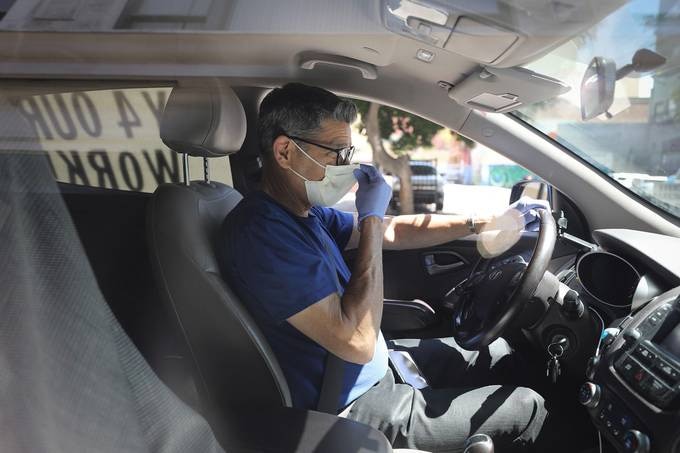
A driver adjusts his face mask as Uber and Lyft drivers with Rideshare Drivers United and the Transport Workers Union of America conduct a ‘caravan protest’ outside the California Labor Commissioner’s office. (Photo by Mario Tama/Getty Images)
Uber will launch two new delivery services in a push to make up for decreased demand for its ride-hailing services.
- Uber Direct will offer deliveries from shops including pharmacies and pet stores.
- Uber Connect will serve as a courier between users.
Uber plans to launch Connect in more than 25 cities around the world.
Uber also got permission to bid on government contracts. It could open the door for over $800 million in new revenue for the company by 2025, Lizette Chapman at Bloomberg News reports.
The scramble to diversify revenue comes less than a month before the company’s investors meet. And activists are already gearing up:
- CtW Investment Group launched a campaign urging shareholders to vote against the company’s executive pay structure.
- They argue a pay cut for executives could go toward drivers whom the company has refused to recognize as employees.
Global tech
Apple is in the way of France’s plan to reopen, its digital minister says.
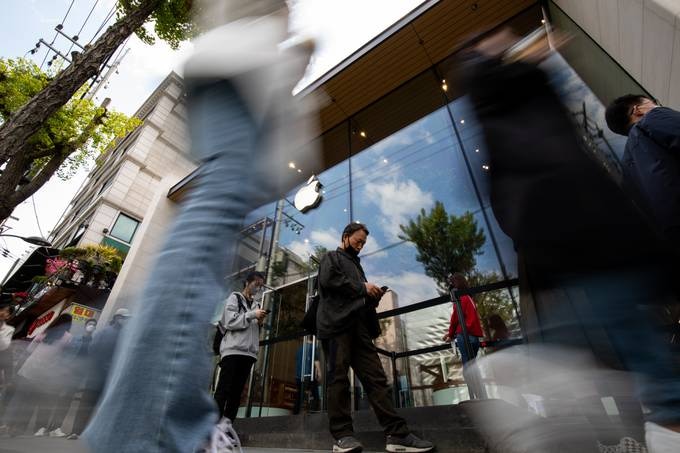
People wearing protective masks wait in line outside the Apple Inc. store in the Gangnam district of Seoul, South Korea. (SeongJoon Cho/Bloomberg)
France wants Apple to remove a feature in its phones that limits the type of Bluetooth tracking the government wants to use for coronavirus response, Helene Fouquet at Bloomberg News reports.
The government wants to deploy the new app in less than a month, before it lifts restrictions on movement placed in March.
An Apple spokesman declined to comment beyond referring to a previous joint statement about its partnership with Google on a Bluetooth contact-tracing app.
Workforce report
More than 300 Amazon employees will call out of work today to protest the company’s warehouse working conditions.
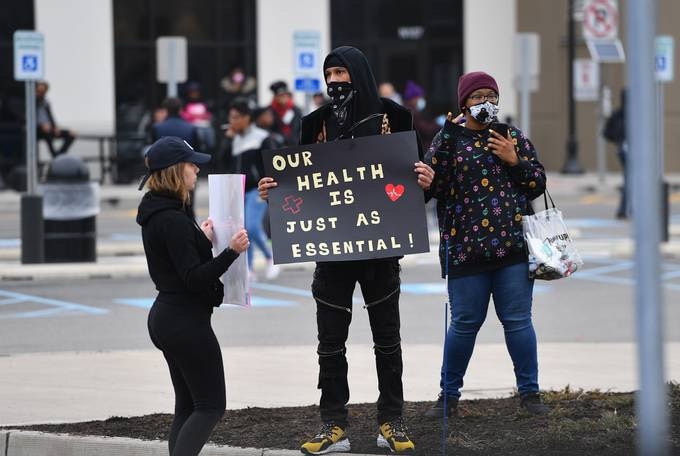
Amazon workers at Amazon’s Staten Island warehouse strike. (Angela Weiss/AFP/Getty Images)
The protest is organized by labor groups United for Respect, New York Communities for Change and Make the Road New York, Chris Rodrigo Mills at the Hill reports. The protest follows strikes at warehouses in Staten Island, Chicago and Detroit.
Corporate employees are planning a sickout to protest warehouse conditions for Friday.
Kickstarter is discussing potential layoffs with union organizers at the company.
The crowdfunding company has already seen a significant drop in crowdfunding projects being listed on the site, CEO Aziz Hasan wrote in an internal memo, Ashley Carman at the Verge reports. Office and Professional Employees International Union, which represents more than half of Kickstarter’s employees, said it was too early to comment on discussions.
Postmates will offer some aid to parents and caregivers during the coronavirus.
Couriers in California and New York that quality will receive cash stipends through the company’s covid-19 relief fund, Candy Chang at Bloomberg News reports.
Trending
Facebook Gaming Is Here—but Who Is It For?
The social giant’s latest standalone app doesn’t offer enough for either casual gamers or esports steaming fans.
Wired
The World Where ‘The Bachelor’ Will Never Stop Airing
Reality TV won’t be filming for the foreseeable future—except in The Sims.
The Atlantic
Mentions
- Twitch hired Tracy Chan as head of product and engineering for music. Chan previously worked at Spotify as director of product management.
- Niantic has named Megan Quinn as chief operating officer. Quinn was a general partner at Spark Capital.
Daybook
Today:
- The Open Technology Institute will host an online event on work-from-home digital security on April 21 at 11:00am.
- Netflix and Snap release their earnings.
Coming up:
- Code for America will host the second of its virtual Summit events – ‘Delivering a Human-Centered Social Safety Net in a Time of Crisis’ Thursday at 9am PT. The webinar will focus on how governments are meeting unprecedented challenges posed by COVID-19 and the importance of a human-centered approach to delivering social safety net services.
Have an event you want our readers to know about? Email tonya.riley@washpost.com.
Before you log off
A TikTok we can all relate to, from The Post’s Dave Jorgenson:

